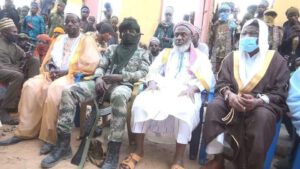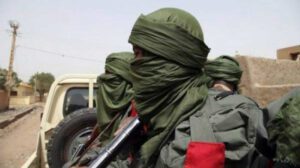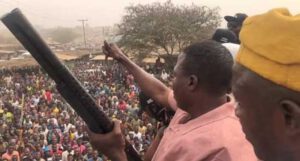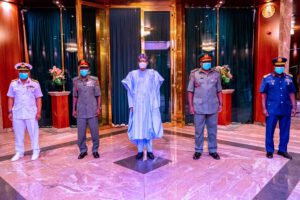By Gabriel Atumeyi
Penultimate Tuesday, January 26, renowned Islamic scholar, Sheikh Ahmed Abubakar Gumi, led an entourage on a tortuous journey into the remote forests of Tubali and Makkai in Shinkafi Local Government Area (LGA) of Zamfara State on a ‘visit’ to two different groups of heavily armed Fulani herdsmen, famed for their notoriety as bandits.
The Nigerian public had woken up to pictures and details of views exchanged between both parties, and the possible way forward for peace to be restored in the state and the entire North west geo-political zone.

*Sheikh Gumi in the bandits’ enclave
After the meetings, the cleric told journalists that what he saw in the fortresses were not just banditry but full blown insurgency, while advocating government support and relief towards ending the ugly spectacle.
Tale of woes, sorrow as terrorists, bandits unleash mayhem on citizens
Zamfara State, like neighbouring Katsina, has been in the grip of banditry and wanton kidnapping for ransom. The bandits unleash terror and leave frightened villagers displaced in the wake of their raids, with the peak being the infamous abduction last December when about 344 students of the Boys Government Science Secondary School, Kankara, were whisked away while President Muhammadu Buhari was visiting his home state.
While Zamfara and neighbouring Katsina states remain the epicentre of banditry, the criminal activities of this groups have not been entirely circumscribed to the two states alone, as Kaduna and Niger states have also been feeling the heat. The Kaduna – Abuja highway, in fact, has unarguably become the most dreaded in the north, as not even the presence of military troops, the Nigerian police personnel and helicopters frequently combing the forests, has been able to deter the daring bandits from carrying out their routine operations.
The tales emanating from Niger state, with its tremendous land mass, is no less frightening.

*Bandits
Added to this mix is Boko Haram’s decade-long insurgency in the North East, despite repeated assurances by the Muhammadu Buhari-led federal administration that the dreaded sect has been decimated. As if to register their continuing presence, on the day the newly appointed Service Chiefs paid a visit to Borno State Governor to assess the situation on ground, the terrorist sect welcomed them with a deadly attack.
But while the North continues to grapple with the hydra-headed monster of terrorism and banditry, stretching the nation’s military resources and personnel to its limits, the South west and South east non-state actors have also been challenging the seeming inability of the Nigerian state to restore peace and order.
In the South east, for instance, the Nnamdi Kalu Indigenous People of Biafra (IPOB)-backed Eastern Security Network (ESN), has been contesting authority with the Federal Government, culminating in the Orlu (Imo State) clash between the group and the Nigerian military between January 22 and 28. It left at least five civilians dead with reports of more casualties on both sides.

What remains worrisome, however, is that IPOB has been waxing strong in the South east despite being designated a terrorist organisation by the Nigerian government.
The emergence of its own paramilitary apparatus, allegedly, to secure the region against herdsmen has set the course for an eventual violent collision with the Nigerian state. Many observers see the January clash as a prelude to many more such violent encounters as both sides engage in a show of force in the Eastern region.
Around the South western end of the country, which for sometimes has been battling with attacks, kidnapping and rape by criminal-minded herdsmen, a new security challenge berthed with the quit notice issued by one Sunday Adeyemo, also known as Sunday Igboho, a self-acclaimed youth leader and Yoruba rights activist, to Fulanis in Igangan in Oyo state.
Upon expiry of the ultimatum given to the Fulanis in the Ibarapa area of the state, Igboho matched words with action as assault and mayhem were unleashed on the Fulanis in the community, reverberating all the way to Ondo State, and creating a precarious security situation, with the potentiality for further escalation. The South west’s regional security network, Amotekun, stood helpless as Sunday Igboho and his followers descended on the suspected killer herdsmen.

*Igboho
Many security analysts opine that this act may put additional strain on the tension in the country, and may ultimately culminate in counter actions likely to inflame religious and ethnic tension.
Added to these is the rampant kidnapping and mindless murders by hoodlums and armed robbers across the country, including the Federal Capital Territory (FCT), with the Kuje-Lokoja road being a hotbed.
Only recently, gunmen invaded an orphanage home in Bwari Area Council of the FCT, and reportedly kidnapped orphans who they demanded a ransom of N10 million before release.
The tales abound.
On Friday, February 5, gunmen invaded the headquarters of the Imo State Police Command killing two police officers; while in Anambra state, unknown gunmen attacked a church, killing a couple and their 36-year-old daughter. Indeed, such cases have become daily occurrences across the country, with overwhelmed, ill-equipped security personnel struggling to maintain a veneer of control.
Banditry, kidnappings dividends of years-long misrule
Speaking to 365Daily, Jide Ojo, a public affairs analyst and development expert, said while Nigeria was in an extremely unenviable position, it can still reposition itself by equipping the military for pro-active operations. He listed rejuvenating the economy and forging strong collaboration with the international community and regional powers as other measures desired to bring about peace.
He said: “The situation is quite worrisome. Nigeria remains one of the countries negatively impacted by terrorism globally. But then, we arrived at this situation due to the misgovernance of the past, and when you misgovern over a period of time, the non-state actors will seize the initiative and given the very large ungoverned spaces that we have, we should not be surprised at the state of things.
“There are two ways to ending this insecurity and insurgency. There is the hard approach and the soft approach and the two have to go simultaneously. The hard approach is equipping and increasing the size of the military, as well as co-ordination between and among security agencies. While the soft approach is all about fighting poverty, providing employment and creating the right economic environment and general good governance.
“The sheer size of Nigeria is so huge, it has a lot of ungoverned spaces and they are in the hands of these non state actors (bandits and insurgents). The government needs to intervene, we need security surveillance of border communities, particularly with over 1400 illegal routes, making trafficking of arms possible,” Ojo said.
Rise of criminal elements as indices of a failed state
Also speaking to 365Daily, former Director General of the National Orientation Agency (NOA), Mike Omeri, said communication remains key in uniting the people behind the government to fight off rampaging criminals and criminal tendencies.
He said: “The state of insecurity is frightening, but I am not downcast. I believe it is something that can be rescued using the right tools and the right tool is communication. We need to hear the kind of communication that is making citizens to form a grand alliance in support of security forces, in support of country, and in support of the government. But the government is not giving us that, so what we have largely is a group of people who seem to be defensive even in the way they address the citizenry, so it helps in the escalation of things. I just hope they address that defect in time.

*Service Chiefs
“The new security chiefs should employ other non-kinetic approach to fighting crimes and banditry. Crime is crime. Most of the hideouts and peoples are known by the security agencies. If you have arrested some people, you should debrief them, they should be able to give you information and lead. Sunday Igboho and the Eastern Security Network, banditry and kidnappings, are all indices of a failed state. People are now giving orders and counter orders against government and it’s directives and positions. If we don’t have communication that brings us together, people will look for alternatives,” Omeri enthused.
In his view, public commentator and convener of Citizens Awareness Against Corruption and Social Vices Initiative, CAACASVI, Olumuyiwa Onlede, believes that intelligence proactivity on the part of the military establishment and cooperation of leaders across board must be strengthened.
Onlede: “The problem is, just the way the Nigeria security agencies were not prepared for insurgency and the war, so they were not prepared for the aftermath of the military operation in the North East, lack of anticipation of the possibility of some of the insurgents escaping military firepower and finding themselves in other regions in Nigeria; then the question is: how will they live, most especially as they have lived the kind of life that is on the basis of crime, the aftermath is what we are experiencing today.
“Armed bandits, as they are called, killer herdsmen, are all insurgents spread across the nation and they find solace in legitimate pastoralism which they use to move freely from one place to another and settle freely anywhere they want and do evil, while hiding under the guise of herdsmen.

*Miyetti Allah
“We will also not totally blame Sunday Igboho for issuing quit notice to killer herdsmen, but he or any other person, has no right to issue quit notice to lawful settlers or burn down people’s houses and properties. We will continue to urge the President, Sultan of Sokoto, Governors and all leaders of Fulani extraction to come out in clear terms to condemn the act by bandits hiding under the guise of herdsmen to perpetuate evil anywhere in Nigeria and also caution the umbrella body of the cattle rearers (Miyetti Allah) to desist from statements and acts that suggest they are accomplices in banditry.
“And we think until this is done, our military and other security agencies will continue to fight a proxy war. The new service chiefs must go back to the drawing board of intelligence gathering so as to identify who really are the enemies of the state. All these must be done urgently, because right now Nigeria is sitting on a keg of gunpowder that is threatening it’s unity,” Onlede said.